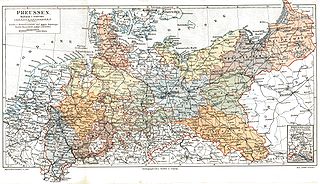See also
- Hagen Site, Montana, United States, an archaeological site
- Hagan (disambiguation)
- Hagin, a surname
Hagen is a city in the Ruhr Area, North Rhine-Westphalia, Germany.
Hagen may also refer to:

Lower Saxony is a German state in northwestern Germany. It is the second-largest state by land area, with 47,614 km2 (18,384 sq mi), and fourth-largest in population among the 16 Länder federated as the Federal Republic of Germany. In rural areas, Northern Low Saxon and Saterland Frisian are still spoken, albeit in declining numbers.

Westphalia is a region of northwestern Germany and one of the three historic parts of the state of North Rhine-Westphalia. It has an area of 20,210 square kilometres (7,800 sq mi) and 7.9 million inhabitants.

A Regierungsbezirk means "governmental district" and is a type of administrative division in Germany. Four of sixteen Bundesländer are split into Regierungsbezirke. Beneath these are rural and urban districts.
Osnabrück is a district (Landkreis) in the southwest of Lower Saxony, Germany. With 2,122 km² it is the second largest district of Lower Saxony.
Sande may refer to:

The Federal Republic of Germany, as a federal state, consists of sixteen states. Berlin, Hamburg and Bremen are called Stadtstaaten ("city-states"), while the other thirteen states are called Flächenländer and include Bavaria, Saxony, and Thuringia which describe themselves as Freistaaten.
Stein may refer to:

The Provinces of Prussia were the main administrative divisions of Prussia from 1815 to 1946. Prussia's province system was introduced in the Stein-Hardenberg Reforms in 1815, and were mostly organized from duchies and historical regions. Provinces were divided into several Regierungsbezirke, sub-divided into Kreise (districts), and then into Gemeinden (townships) at the lowest level. Provinces constituted the highest level of administration in the Kingdom of Prussia and Free State of Prussia until 1933, when Nazi Germany established de facto direct rule over provincial politics, and were formally abolished in 1946 following World War II. The Prussian provinces became the basis for many federal states of Germany, and the states of Brandenburg, Lower Saxony, and Schleswig-Holstein are direct successors of provinces.
Gronau may refer to:

The German Emperor was the official title of the head of state and hereditary ruler of the German Empire. A specifically chosen term, it was introduced with the 1 January 1871 constitution and lasted until the official abdication of Wilhelm II on 9 November 1918. The Holy Roman Emperor is sometimes also called "German Emperor" when the historical context is clear, as derived from the Holy Roman Empire's official name of "Holy Roman Empire of the German Nation" from 1512.
Neuenkirchen can refer to several municipalities in Germany:
Oldendorf can refer to several places in Germany:
Horst may refer to:
Northern Germany is a linguistic, geographic, socio-cultural and historic region in the northern part of Germany which includes the coastal states of Schleswig-Holstein, Mecklenburg-Vorpommern and Lower Saxony and the two city-states Hamburg and Bremen. It contrasts with Southern Germany, Western Germany and Eastern Germany.
Egge is the name of various elongated hill crests or ridges in the Low German dialect. It may also refer to:
Großes Moor may refer to:
Landwehr is the German word for a type of national home guard or territorial army. It may also refer to: